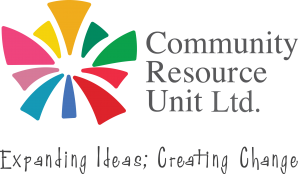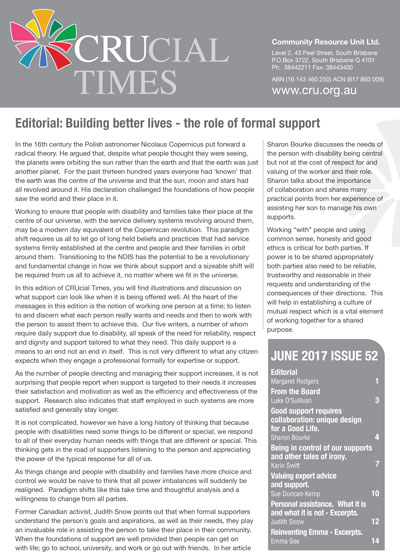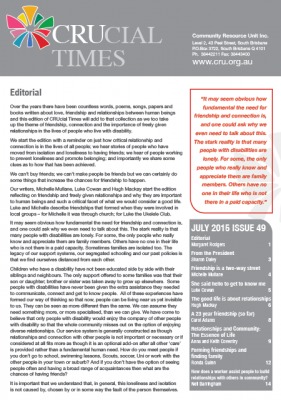THE ROLE OF FUNDED SERVICES
Introduction
On this page we illustrate what we mean by good support where professional services and funded support blends with informal, freely given support to enhance the quality of life of the person at the centre. It is important to note that in every example, the person and the people who love and care about them have taken the time to think about what is right for them and have thought about how to get started to put some things in place. It is different for each and every person. It is very intentional. It doesn’t just happen automatically. You won’t find a formula within these pages, but there is lots of shared wisdom and experience on where to start and what might be useful to consider.
As we move to a new era with more flexibility, we have the chance to rethink how formal support can be incorporated into a person’s life and what an ideal combination of supports would be. The gradual introduction of individualised funding over recent years has highlighted the potential for the formal to usurp or take over the informal and we see the cost of that in the loneliness and disconnection in many people’s lives. Formal support may be very high quality and provided by caring, committed staff but if the person has no friends, little contact with family, and is isolated from their neighbourhood and community, then the promise of individualised funding remains unfulfilled.
People taking charge and making the majority of choices around their paid service is not new. There are examples within this page of people and their families pioneering this approach individually or collectively for many years before there was a funding program to do so. Professionals, workers and organisations working well in partnership with people with disabilities and their families is not new either, and you will find examples here of people working in ‘right relationship’ and their thoughts on clarifying levels of responsibility and authority.
To clarify, we use the term self-direction to describe arrangements where decisions and choices that determine the direction of the person’s life rest with the person and their close supporters. This does not mean the person needs to take on all the administration and human resource management tasks. When people who are self-directing do take on the majority of the administration tasks they are said to be self-managing. We have dedicated a section to describing and illustrating self-management because for many people this will be a new option and we know people are curious about what is involved and what it takes.
Many people will prefer to have a service provider deliver their supports and we have included some thoughts on choosing a provider and working well with your provider so that you can direct your service even if you choose not to manage all the administrative tasks. Some agency leaders describe how they rearranged their resources to undo group models and respond in a more person centred way. On this website this is generally referred to as Agency Transformation.
Re-imagining supports: Creating the right blend
Sarah Scown
![]() Anything is possible when people tap in to their passions and strengths and work creatively with these. Everyone has the potential and capacity to contribute in a meaningful way; it is about discovering a pathway based on what really excites and motivates each person, and then making sure they get the support they require, whether this is from family, friends or with assistance from paid supports.
Anything is possible when people tap in to their passions and strengths and work creatively with these. Everyone has the potential and capacity to contribute in a meaningful way; it is about discovering a pathway based on what really excites and motivates each person, and then making sure they get the support they require, whether this is from family, friends or with assistance from paid supports.
In this page we will…
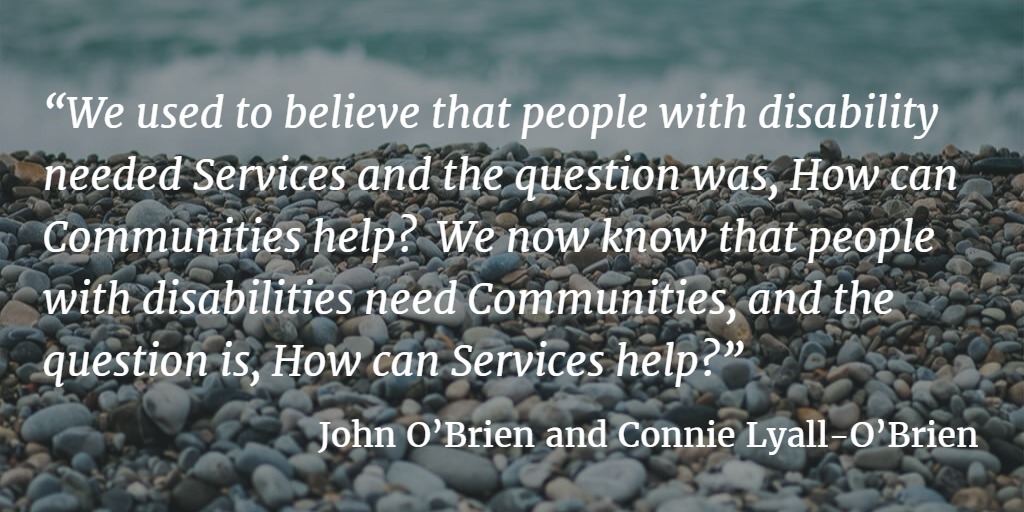
CRUcial Times 52: The Role of formal support in building better lives
WHAT CAN GOOD SUPPORT LOOK LIKE?
In this section you will find illustrations and discussion on what support can look like when it is being offered well. There is reliability and spontaneity; respect and dignity; it’s a means to an end not an end in itself. When formal supporters understand the person’s goals and aspirations, as well as their needs, they can play an invaluable role in assisting the person to take their place in their community.
Even when support is provided by family, friends, classmates or flatmates it is still important to expect the support will be respectful, tailored to what the person needs and of a high quality. When the foundations of support are well provided then people can get on with life, go to school, university, work or go out with friends. This is in contrast to the difficulty of negotiating to get basic support needs met and spending the day waiting for someone to arrive; sometimes someone you have never met before.
Some people prefer to enter into a life sharing or home sharing arrangement with another person as a way to get the support they need. Each person negotiates this exchange differently with some bartering of in-kind resources such as rent and others making financial payments.
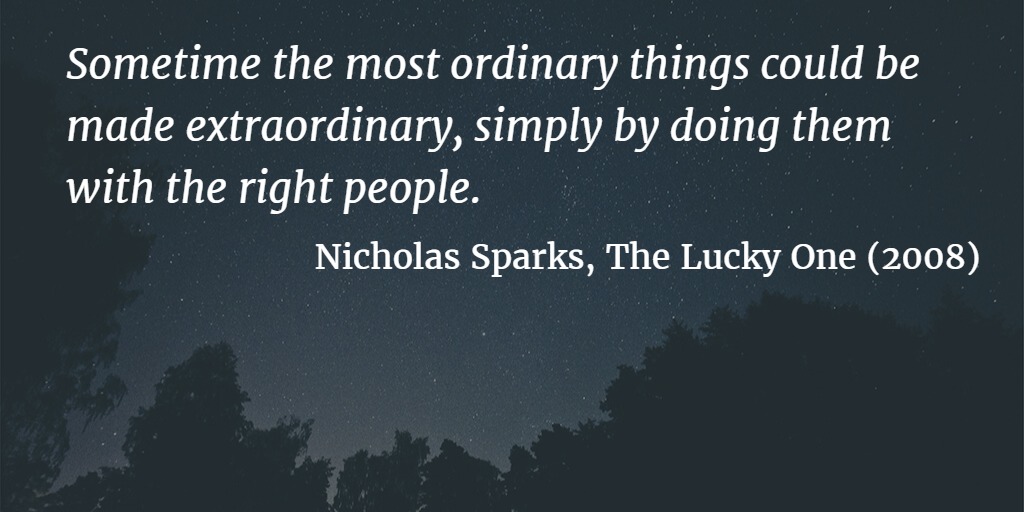
There is no “I” in team: Lessons in creating your own dream team
Carolyn Campbell McLean
![]() The choice of people who are involved in our lives (paid or unpaid) has a huge impact on our quality of life. These people will be in our life, in our homes, they will meet our family, and in some instances become part of the family… I believe this is one of the most important elements of why I have secured a successful team. I have chosen people who are well matched to me in many different ways. It’s a critical factor.
The choice of people who are involved in our lives (paid or unpaid) has a huge impact on our quality of life. These people will be in our life, in our homes, they will meet our family, and in some instances become part of the family… I believe this is one of the most important elements of why I have secured a successful team. I have chosen people who are well matched to me in many different ways. It’s a critical factor.
Don’t just do something… stand there! An invitation to conversation
Alf Lizzio
![]() An orientation to action is absolutely necessary – after all we don’t want to be all talk and no action. I would suggest however that there might be benefits, to both our effectiveness and our personal satisfaction, if we supported our actions by regular and friendly questioning of each other about what it is that we think we are doing… giving ourselves permission to take time to get clear about what is most important can be useful… In case any unreformed helpers are wondering, this is real work and it’s not ‘being selfish’. Find someone, agree to be respectfully challenging of each other and start a conversation.
An orientation to action is absolutely necessary – after all we don’t want to be all talk and no action. I would suggest however that there might be benefits, to both our effectiveness and our personal satisfaction, if we supported our actions by regular and friendly questioning of each other about what it is that we think we are doing… giving ourselves permission to take time to get clear about what is most important can be useful… In case any unreformed helpers are wondering, this is real work and it’s not ‘being selfish’. Find someone, agree to be respectfully challenging of each other and start a conversation.
Redefining the paid assistant role
Nadia Samperi
![]() I’ve learnt that I too become part of the group/community that Margaret is part of and that this is natural. Me being part of the group – rather than keeping my distance – helps me get to know people better and makes it easier for me to find interests that Margaret may relate to. However, I am always aware that the priority is supporting Margaret‟s relationships and involvement.
I’ve learnt that I too become part of the group/community that Margaret is part of and that this is natural. Me being part of the group – rather than keeping my distance – helps me get to know people better and makes it easier for me to find interests that Margaret may relate to. However, I am always aware that the priority is supporting Margaret‟s relationships and involvement.
PERSONALISING SUPPORT
Choosing and Negotiating what you need
The term person-centred is commonly used to refer to the notion of working one person at a time; to listen to and discern what each person really wants and needs and then working with the person to assist them to achieve this. It is not surprising that targeting support to the person in this way increases satisfaction and motivation, efficiency and effectiveness. It is not complicated. One of the problems with any term that is easier to say than to achieve, is we find all types of responses now referred to as person-centred, even when they clearly neither start nor finish with the individuals needs and wants. We have a long history of thinking that the best way to meet the needs and wants of people with disabilities is to offer something different or special and to offer that somewhere separate to the local school or community and with people of their own kind. This old fashioned thinking makes things complicated and gets in the road of supporters listening to the person and appreciating the power of the typical response for all of us.
Spending time thinking about what you want and don’t want, and time spent intentionally planning are powerful ways to take some control over the future. (Link to Vision and Planning section) The idea of people with disabilities and families clarifying with the service provider what will remain as private or family business and what tasks and responsibilities would be taken on by the organisation as service business is simple but very important. Relying on assumptions about who does what and the boundaries of that can lead to confusion, frustration and the erosion of informal relationships. Discussion and negotiation to determine who is responsible for ‘the grey areas in between’ also need to be held regularly.
This section contains examples of what some people and their families have found helpful. It is useful to note that due to the ever evolving nature of working with people to meet their needs and wants, the stories are quickly out of date as the person meets those goals and moves on. This is also true of person centred organisations. They may have enduring values and principles but they are never static. These articles remain instructive however, as a record of their thinking and their description of how people got started on a more individualized path.
Being clear about what you want is an important prerequisite to negotiating with others. For some people deciding or communicating what they want can be difficult and in this section you will find information about supporting people in their decision making.
It’s all about Matthew – using support to build a life
Wendy Farrelly
![]() We are also able to communicate with staff about our expectations and the reasons for them. We train his support workers how to work specifically with Matthew, since his needs are the priority and he has different needs to other people.
We are also able to communicate with staff about our expectations and the reasons for them. We train his support workers how to work specifically with Matthew, since his needs are the priority and he has different needs to other people.
The training is tailored for him. Because people are being employed solely to support Matthew, we can ensure they are physically fit and that they don’t smoke. It is important that Matthew not be made unnecessarily vulnerable by factors such as smoke.
Challenging The Myth That One Size Fits All
Maureen McLeish, Anita O’Brien and Deb Rouget
![]() …sadly in reality, for many people with disabilities, the attraction to view all needs of a particular disability as the same, has led to many standardised responses that can’t possibly meet the uniquely complex needs of each individual. No one needs to be with “their own kind” rather every human being needs to be supported to lead their own uniquely fulfilling life…
…sadly in reality, for many people with disabilities, the attraction to view all needs of a particular disability as the same, has led to many standardised responses that can’t possibly meet the uniquely complex needs of each individual. No one needs to be with “their own kind” rather every human being needs to be supported to lead their own uniquely fulfilling life…
What if we believed that people with disabilities could lead a uniquely tailored, personally fulfilling life in the community like most people take for granted? Perhaps that would open us to the questions of how might we achieve this.
My Quest – Will’s Story
Will Proctor with assistance from Catherine Raju
![]() Self-direction has made a big difference to my life. It means that I can employ my own staff. I have control over who they are and what they do. The mix of paid workers and unpaid support has worked for me so far.
Self-direction has made a big difference to my life. It means that I can employ my own staff. I have control over who they are and what they do. The mix of paid workers and unpaid support has worked for me so far.
On weekdays I have rostered staff during the day. I also have a flatmate, a university student, who assists me five days each week from early evening till early morning, including any support I might need overnight. We have negotiated that we will both do our own thing on the weekends so he is free to do what he wants then. My family help during that time.
Getting Out of the Way
Frank Crupi
![]() When we got to the point of admitting that there is a significant gap between our rhetoric and what we really deliver we had open and frank discussions about being courageous enough to act on that recognition. The openness and depth of reflection and questioning we were asking people who had invested huge amounts of themselves over the years to undertake was challenging and enlightening to us all.
When we got to the point of admitting that there is a significant gap between our rhetoric and what we really deliver we had open and frank discussions about being courageous enough to act on that recognition. The openness and depth of reflection and questioning we were asking people who had invested huge amounts of themselves over the years to undertake was challenging and enlightening to us all.
Listening with intent and acting with purpose
Kathryn Treston and Bronwyn Moloney
![]() Sometimes as workers, we facilitate planning sessions with a person and his/her network and then immediately pick up the planning notes from the meeting and assume ownership of them. It’s imperative that we ask, ‘Whose plan is this?’ ‘Who owns the notes?’ ‘Who owns the communication book?’
Sometimes as workers, we facilitate planning sessions with a person and his/her network and then immediately pick up the planning notes from the meeting and assume ownership of them. It’s imperative that we ask, ‘Whose plan is this?’ ‘Who owns the notes?’ ‘Who owns the communication book?’
We need to find more respectful ways of determining with the person how the transfer of information is achieved, how privacy is guarded and how the person can stay more in control of his/her own information.
Workforce Innovation through Self-Managed Supports
Workforce Innovation through Self-Managed Supports is a website developed by the National Alliance of Capacity Building Organisations (NACBO), has been designed to resource people with disability, their families and supporters who are looking to self-manage their own supports.
It includes a collection of:
- Stories of people with disability and their families who are experienced at self-managing
- Support workers who work for people who self-manage
- Guides, fact sheets and suggestions about self-management
The website also includes a report that draws on the experience of 25 people living with disability and their families who have been self-managing their NDIS or state-based funding packages for some time, and 15 of their support workers. The goal of the report is to identify and share the key factors for success or difficulty in these arrangements.
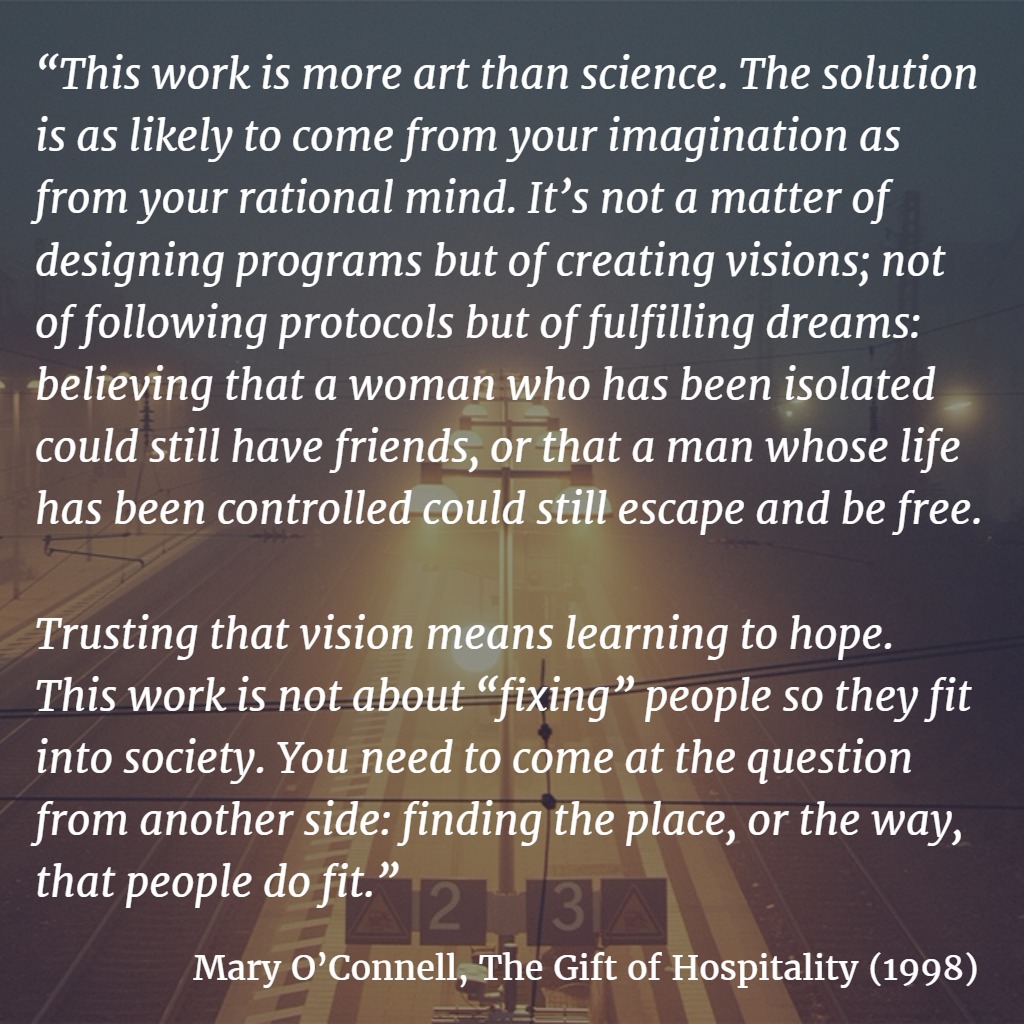
Choice and control: social care must not disable people with intellectual disabilities
Val Williams
![]() Disabled people should not be divided into the ‘cans’ and ‘cannots’. Choice and control are not all-or-nothing characteristics, but can be nurtured through the (extra)ordinary skills of those who take up roles as personal assistants or support workers. By looking at how these relationships play out in real life, people with intellectual disabilities themselves can help us learn more about how to manage practices in respectful ways – and to avoid practices which become neglectful or abusive.
Disabled people should not be divided into the ‘cans’ and ‘cannots’. Choice and control are not all-or-nothing characteristics, but can be nurtured through the (extra)ordinary skills of those who take up roles as personal assistants or support workers. By looking at how these relationships play out in real life, people with intellectual disabilities themselves can help us learn more about how to manage practices in respectful ways – and to avoid practices which become neglectful or abusive.
Further Reading
Choreographing Life
Jan Dyke (HomesWest)
International advances in self-direction: themes from a disability leadership exchange
In all four countries, people who self-direct exercise high levels of choice and control and are able to individualize their services and supports to promote a good life in the community. The exchange also revealed challenges and possible solutions to improve and expand self-direction.
Supporting People to Make Decisions
Like many skills, decision making gets better with practice. It is important to assume that people can make their own decisions and to put the support in place to assist them to do that. As their skill level and confidence increases the support can be changed to reflect that.
The term, supported decision making, refers to both this process for assisting people and also a legal mechanism. In this section we are referring to the former but in the resources below you will also find reference to the legal mechanism.
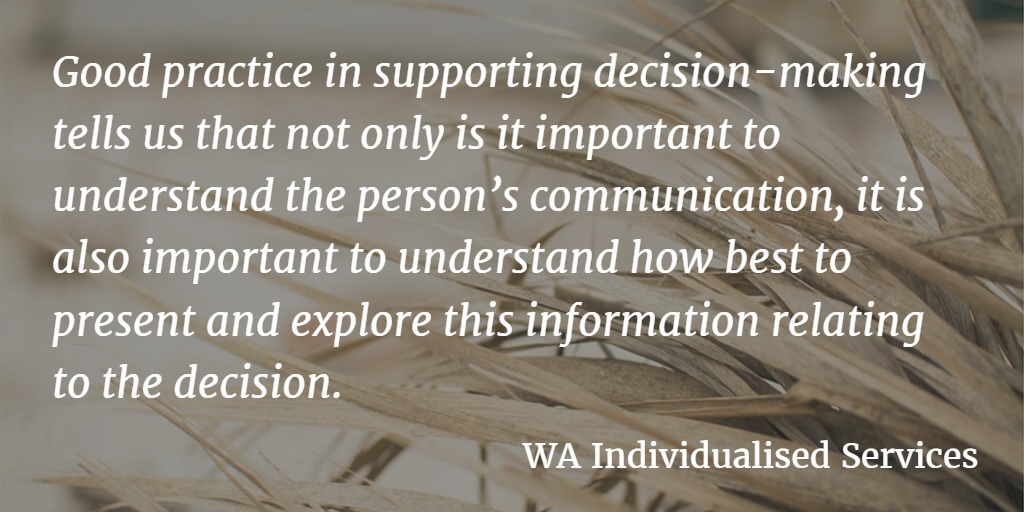
Further Reading
Supporting Decision Making
Victorian Department of Heath and Human Services
(Downloads a word document)
HOW TO SELF-DIRECT YOUR OWN SUPPORT
Self-Direction and Self-Management
In this section we are keen to provide some practical information and strategies for both self-direction and self-management.
We use the term self-direction when we are describing arrangements where the decision making and choices that determine the direction of the person’s life rest with the person and their close supporters – this does not mean that the person needs to take on all the administration and human resource management tasks. When people who are self-directing do decide to take on the majority of the administration tasks they are said to be self-managing.
Self-management is not an option that will suit everybody, but because self-management is becoming possible for more people and many people are curious about what is involved, we have included information here to help you decide if you want to try it and to think about the pros and cons for you.
We expect that many people will choose to have their funding administered by service providers. If you have a service you are happy with and trust, this is a good time to talk with them to negotiate what you want and need in the future. If you are not happy, then this is a good time to re-negotiate with an existing provider or to consider making a change. It is important to know that the NDIS will bring flexibility to try different ways; to perhaps self-manage one part of your funding but not all or to change your mind if your circumstances change.
Many people with disabilities are concerned that they don’t have the skills to interview, train and work with staff. This section contains some practical information on what others have found helpful.
Not Reinventing the Wheel
Rather than re-invent the wheel, we are keen to draw your attention to some very good resources developed by people and organisations who are actively engaged in and influencing the development of self-direction and self-management in Australia:
Pearl
This website was developed in Queensland by Staffing Options, in collaboration with the Department of Communities, Child Safety and Disability Services
Ideas for Self-Direction
This booklet was written by Ellis McCrae Associates and developed by Family Advocacy Inc. NSW
Workforce Innovation through Self-Managed supports
This website contains videos, fact sheets, a report and stories that share the lived experience of people who are self-directing under the National Disability Insurance Scheme (NDIS).
We offer a selection of wisdom, stories and insights from others that we hope illustrate the different ways people can self-direct; some of the dilemmas and issues that are likely to arise and some strategies to overcome them.
Taking control
Sylvana Mahmic
![]() For our family, this flexible and individual focus was appealing. We had spent years trying to fit our son into other programs. Due to the nature of his disability and additional health problems, this has been a constant challenge. Now, he could be at the centre of everything, and the program would work around his needs. He didn’t have to fit in with what was being planned for the majority: it was all about him.
For our family, this flexible and individual focus was appealing. We had spent years trying to fit our son into other programs. Due to the nature of his disability and additional health problems, this has been a constant challenge. Now, he could be at the centre of everything, and the program would work around his needs. He didn’t have to fit in with what was being planned for the majority: it was all about him.
Dan & Scott’s Top Benefits of Self-Direction (Self-Management)
Working with a service provider
Libby Ellis
![]() Clearly setting out the values and principles you hold dear will form
Clearly setting out the values and principles you hold dear will form
the foundation of the partnership and will help guide decision-making when it comes to operational matters. Having these clearly defined will act as the framework through which problems or challenges are analysed and solutions arrived at – solutions that are in the person’s best interests and not diluted by competing interests.
Seven steps to self-direction Workbook
Griffith University
![]()
A person with disability may have a range of people supporting them to have a good life; including family members, committed friends and paid support-workers.
This workbook is a guide to developing supports that work respectfully and constructively together—sometimes this is called right relationship. It is for anyone involved in a self-directed arrangement and wants it to work as well as possible. This workbook can be used by a group, or on your own.
There are seven-steps—you can start at the beginning, or at any step along the way
Pearl: Self-Direction: Terms and definitions
A number of different terms are used in articles and discussions about self-direction. Generally these terms are used to describe arrangements that enable people with disability to direct their own support, either on their own or with the support of others eg family members, friends, networks, circles of support.
An important common element in these terms and definitions is that the ‘self’ in self-direction refers to the person who requires support.
Employing and Working With Staff
Many people with disabilities are concerned that they don’t have the skills to interview, train and work with staff. This section contains some practical information on what others have found helpful.
Michael Smull, Chair of the Learning Community for Person Centered Practices
Useful Resources
Interviewing - Best Practices (word doc)
Inclusion Alberta: Darrell Cook Family Managed Supports Resource Centre.
A Guide to Engaging your own Support Workers
My Place WA
The Importance of Investing in your Support Workers
Websites offering values-based support worker training
Community Resource Unit Ltd.
“Getting to the Heart of What Matters” is the training developed by CRU for support workers. This is run on a semi-regular basis and has been delivered publicly, as well as in partnership with organisations.
Open Future Learning
This website offers online modules on a wide range of topics that have been developed in conjunction with some of the great thinkers in the disability world.
Conversations that Matter
Norman Kunc and Emma Van der Klift developed Conversations that Matter to create ongoing dialogues about provocative and challenging issues. The website’s aim is not to inspire people, but to provoke self-reflection, deep-thinking and meaningful change.
Every moment has potential
This Australian online resource offers free modules that explores ways of working that enables everyone, no matter what their level of intellectual or physical disability, to make choices and participate in meaningful activities and social relationships.
Strengthening the Capacities of Support Workers
Lesley Gisane
![]() I believe that there is work which is important for the service workers to do in order to bring their best selves into their support roles. For me, this comes down to three key areas: education, reflection and mentoring.
I believe that there is work which is important for the service workers to do in order to bring their best selves into their support roles. For me, this comes down to three key areas: education, reflection and mentoring.
Throughout my career, I have found that education and development opportunities that are offered in a values-based framework have given me an opportunity to reflect on my role in people’s lives through a greater consciousness about the deeply held values that drive human behaviour. It is necessary… to create a culture that encourages workers to have greater awareness of their own values and how this affects their work.
Best Knowledge? Blending Knowledge in the Age of Person-Centred Support
Adrienne McGhee
![]() Workers who diligently respond to the ever-changing needs, aspirations and lives of people with a disability will need opportunities to accumulate, to grow, and to shape their knowledge so they can offer relevant and effective supports that are aligned with who people are. We need to acknowledge the time, guidance and strategic thinking required by workers to build robust bodies of knowledge.
Workers who diligently respond to the ever-changing needs, aspirations and lives of people with a disability will need opportunities to accumulate, to grow, and to shape their knowledge so they can offer relevant and effective supports that are aligned with who people are. We need to acknowledge the time, guidance and strategic thinking required by workers to build robust bodies of knowledge.
If we fail to create opportunities for workers to build strong individualised knowledge around people, we will inevitably compromise the quality of people’s support and the outcomes we strive for.
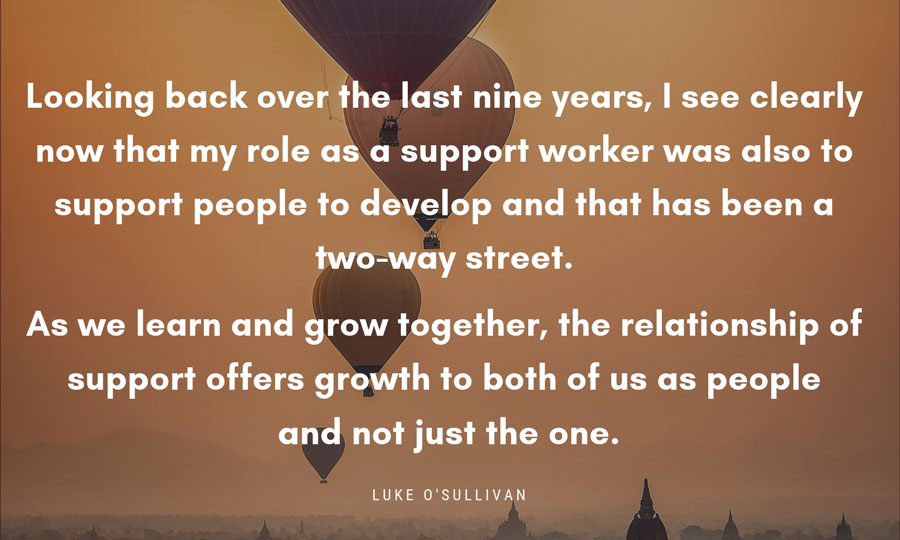
BLENDING SUPPORTS TO CREATE A GOOD LIFE
Informal, Funded and Mainstream
As we move to the NDIS, our hope would be that people with disabilities and families take up this opportunity to have a good life in community, supported by and capitalising on the best combination of formal (paid), informal and mainstream supports. Informal support is a catch-all term used to describe the support offered by family, friends, neighbours and people who are not in a paid role. NDIS funding will not cover mainstream supports. It recognises that people with disability should be able to access the same mainstream systems such as school, education, health and transport available to all citizens.
In the lives of people with disability, the importance and authority of each group of supporters can become confused. We witness the experience and knowledge of family and friends becoming secondary to the contribution of the formal supporters. If we are not careful, we see relationships with friends and opportunities to be part of the day-to-day rhythms of life replaced by specialised responses and supports, and people’s lives are poorer for that move.
When natural, freely given support is not valued as the primary support but relegated to second place, we see the practical contributions offered by natural supporters being fitted into a person’s week after the formal support is in place. Family and friends begin to be seen as unpaid support workers; filling the shifts that workers don’t do rather than the reverse. It will be a challenge to ensure that the additional paid support on offer from the NDIS actually improves the quality of life of people with disability. If people take up more paid support without challenging our past thinking and habits and considering carefully where it fits in relation to their informal, freely given supports then there is a great risk that the informal supports will be overpowered or overshadowed. When this happens, people with disability may have good and more plentiful formal support but they are unlikely to have the rich experience of living an ordinary life in community. If used well, funding, especially when it is individualised, can be extremely useful but it can’t buy a life.
The Strengths and Limitations of funding in creating a Good Life
Jeremy Ward
![]() How does funding alone help someone develop meaningful unpaid relationships; to enrich their spiritual life; to love and be loved; to maximize financial security; to have their own home to come home to; to keep them safe?
How does funding alone help someone develop meaningful unpaid relationships; to enrich their spiritual life; to love and be loved; to maximize financial security; to have their own home to come home to; to keep them safe?
Some people need support to assist them to interact with others, and to seek out opportunities in their community, but this does not have to be done always by paid support workers.
Principles for Partnering Between Natural and Formal Supporters
Michael Kendrick
![]() A thoughtful combination of natural and formal supports can potentially enrich a person’s wellbeing. ‘Formal’ supports are various forms of assistance provided to a person via paid formal services, professionals and agencies. Informal or ‘natural’ supports would include all of the many forms of everyday helpfulness and assistance ordinary people freely provide to each other in daily life…
A thoughtful combination of natural and formal supports can potentially enrich a person’s wellbeing. ‘Formal’ supports are various forms of assistance provided to a person via paid formal services, professionals and agencies. Informal or ‘natural’ supports would include all of the many forms of everyday helpfulness and assistance ordinary people freely provide to each other in daily life…
Every person’s life experience is unique, so being able to consider some universal principles such as the following enables interested people to carefully weigh what would be optimal for a given person.
Fact Sheet: Natural Supports
Janet Klees
![]() Everyone relies on natural support at different times and at varying degrees throughout their life. Consider who you call on to get some advice, think through a problem or get practical assistance for a job you can’t do on your own. You are likely to call on family, friends, colleagues, neighbours and sometimes acquaintances or friends of friends – depending on what it is you need.
Everyone relies on natural support at different times and at varying degrees throughout their life. Consider who you call on to get some advice, think through a problem or get practical assistance for a job you can’t do on your own. You are likely to call on family, friends, colleagues, neighbours and sometimes acquaintances or friends of friends – depending on what it is you need.
Life Sharing
In this section, we offer a number of resources that describe life sharing or home sharing arrangements as an example of one way that people have found to get some of their needs met. It is in itself a blend of formal and informal supports. This is not as clear cut as employing someone or being a flatmate but is often a combination of both. Sharing a home can provide an opportunity for a deeper connection to occur where there is more give and take from everyone involved.
Life Sharing
Pat Fratangelo
![]() As we begin to listen differently to what people actually want, we find that often times those coming for services do not want what has been normally offered. People are beginning to ask more and more for ordinary and regular lives in partnership with other community members. It is not that the person miraculously needs less support and that human service system is not necessary, the support just needs to be delivered in a very different manner, more creatively with community citizens in partnership in integral roles with those you are paid to support. It is this combination of supports and services that will enable the person to live more effectively and contently in the long haul.
As we begin to listen differently to what people actually want, we find that often times those coming for services do not want what has been normally offered. People are beginning to ask more and more for ordinary and regular lives in partnership with other community members. It is not that the person miraculously needs less support and that human service system is not necessary, the support just needs to be delivered in a very different manner, more creatively with community citizens in partnership in integral roles with those you are paid to support. It is this combination of supports and services that will enable the person to live more effectively and contently in the long haul.
There Comes a Time in Every Young Man’s Life
Pam Termont-Schenk
![]() Jamon’s flatmate has an ordinary relationship with Jamon with some additional responsibilities. Flatmates know what Jamon expects of them; things like trust (which he explains and goes into detail about what that looks like for him); to live here freely as a companion and friend and not be in a more formal paid or volunteer role; and to have a genuine desire to live with him and assist him to share life with family and friends.
Jamon’s flatmate has an ordinary relationship with Jamon with some additional responsibilities. Flatmates know what Jamon expects of them; things like trust (which he explains and goes into detail about what that looks like for him); to live here freely as a companion and friend and not be in a more formal paid or volunteer role; and to have a genuine desire to live with him and assist him to share life with family and friends.
My Life, Your Life, Our Life
WA Individualised Services
![]() How these relationships look, feel and evolve for each one of us will differ based on our own personalities, circumstances and values. However the need to belong and connect to others matters to everyone regardless of ability, age, health and experience. It is for this reason that people who work in Human Services [need to] strive to assist others to develop good support systems that enhance, promote and develop their relationships.
How these relationships look, feel and evolve for each one of us will differ based on our own personalities, circumstances and values. However the need to belong and connect to others matters to everyone regardless of ability, age, health and experience. It is for this reason that people who work in Human Services [need to] strive to assist others to develop good support systems that enhance, promote and develop their relationships.
WORKING TOGETHER IN RIGHT RELATIONSHIP
Rethinking Choice and Control
Whichever way formal supports are delivered to the person, whether through self-management or in partnership with a provider, at school or in a therapy or medical setting much more will be achieved if there is a culture of mutual respect. Working to create respectful responses together to meet the person’s needs will always be more effective than disjointed or antagonistic activities.
Michael Kendrick (2005) describes right relationship as having a shared commitment and ideal, and being achieved only when the following are in place:
- a genuine desire to work together
- an appreciation of each other’s strengths and capacity to contribute
- a willingness to have an ethical relationship, both at the level of personal daily interactions, as well as in regards to structures and formal roles.
Traditionally our human service agency system has had some difficulty getting its relationships with its service recipients in proper order. People who use services and those who are close to them often report feeling overwhelmed by how difficult it is to get services to behave towards them in a way that they feel is helpful and respectful. It is not that there aren’t instances and individuals they deal with who behave well, it is that such conduct is exceptional rather than the rule.
Working “with” people, rather than “at”, “on” or “down” to them and using common sense, honesty and good ethics is critical for both parties, and establishing a culture of mutual respect where power is shared appropriately is a very important element of working together for a shared purpose. Both parties also need to be reliable, trustworthy and reasonable in their requests and understanding of the consequences of their directions.
Obviously, not everything in service arrangements is negotiable. While core personal decisions need to stay with the person themselves, there will be some legal or service requirements that need to stay with the provider or worker, and those things that aren’t set should be negotiated rather than imposed. Having a written agreement that sets negotiated boundaries for authority and its delegation is very helpful. As things change and people with disability and families have more choice and control we would be naive to think that all power imbalances will suddenly be realigned.
Why being in Right Relationship is Important
Paraphrased from Dr. Michael Kendrick
A Credo for Support
Norman Kunc & Emma Van der Klift
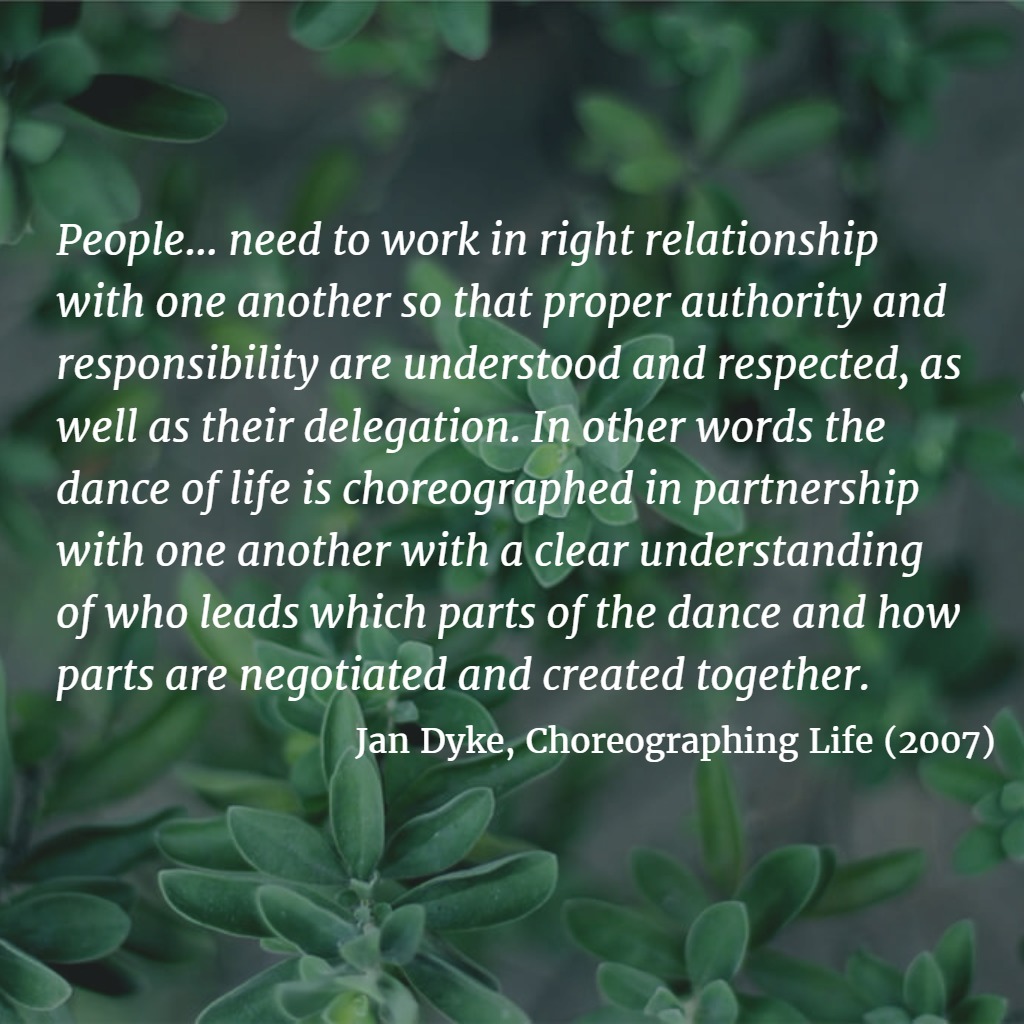
What does this mean for people with disabilities and families?
The challenge for people with disability as they take on more control, particularly those in the employer role is to respect their staff and the contribution they are making; to be very clear about what is non-negotiable, when to compromise, what is possible and what just can’t be done.
Some Initial Thoughts On Establishing “Right Relationship” Between Staff, Professionals, Service Organisations and the People They Assist
Michael Kendrick
![]() Whether we like it or not patterns are now in place that shape people’s lives, hopes and the details of what is or is not possible for them. If we find we do not like them or cannot live with them then as advocates, change agents and citizens we need to begin to see what it is that would be worthy ideals that might serve as the base for a better, “right relationship” between those who provide support and those who rely on it. These will be the defining discussions in the years ahead and may well come to dramatically alter what we now understand as being “service”.
Whether we like it or not patterns are now in place that shape people’s lives, hopes and the details of what is or is not possible for them. If we find we do not like them or cannot live with them then as advocates, change agents and citizens we need to begin to see what it is that would be worthy ideals that might serve as the base for a better, “right relationship” between those who provide support and those who rely on it. These will be the defining discussions in the years ahead and may well come to dramatically alter what we now understand as being “service”.
What does this mean for professionals, support workers, human service staff and others in paid roles?
Workers and professionals can bring lots of valuable expertise, skills, experience and an outside perspective. Their challenge is to share that with the person without taking away their personal authority. This involves letting go of the belief that the experts know better than the person themselves about how they should live their lives.
Systems that are both flexible and designed by and with individuals are more likely to satisfy the service recipients than those that institutionalise people into standardized patterns. These systems relate to each person as unique and their service is designed and operated accordingly. Research also indicates that staff employed in such systems are more satisfied and generally stay longer.
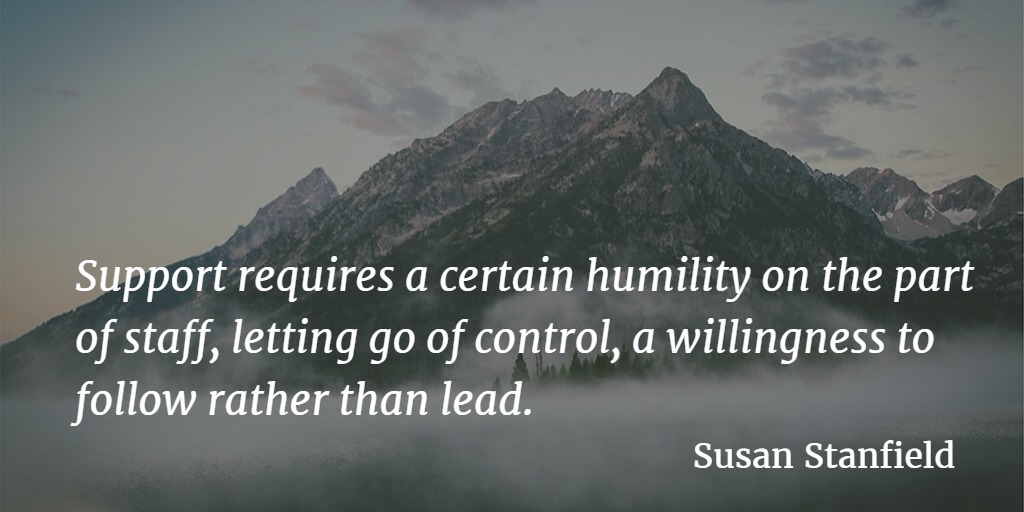
Personal Assistance: What It Is and What It Is Not
Judith Snow
![]() What is personal assistance? It is not being a nurse, a butler or a housekeeper although at times it may resemble these roles. Personal assistance is functional support provided through a personal relationship. It is a response that makes it possible for people with unusual abilities to participate fully in the community, contribute to society…. and have great lives.
What is personal assistance? It is not being a nurse, a butler or a housekeeper although at times it may resemble these roles. Personal assistance is functional support provided through a personal relationship. It is a response that makes it possible for people with unusual abilities to participate fully in the community, contribute to society…. and have great lives.


